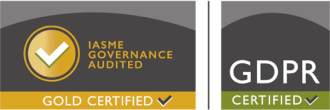
Posted: 3rd March 2021
All small to medium-sized businesses have security threats, but the level of data held in the legal sector means cyber security for law firms requires a particularly high-level of consideration.
So, to get you thinking about your cyber security systems, we’ve pulled together these essential tips. How many of these do you follow in your law firm?
Top 7 tips on cyber security for law firms
Tip #1 Cyber security awareness training for all staff.
Your staff members are your biggest asset, but also your largest cyber security vulnerability.
Phishing attacks are popular with cyber criminals and target anyone sat in front of a PC in your organisation. The most common sign of a phishing attack is an email with a call for you to act or a tempting pop-up on a website.
Sophisticated spear phishing attacks are becoming more common place and display personal information on the user that appear to come from a reliable source. Socially engineered spear phishing attacks can trick the most compliant computer user, so it’s essential all staff members are trained in how to avoid falling victim.
Educating your teams is the best way to tackle this threat. We recommend you make regular cyber security training available to everyone in your company with simulated phishing attack drills. This will protect both your staff and your law firm.
At Jupiter IT, we offer training software that sends out fake phishing emails to your team. As a result, you’ll receive a report detailing who fell prey and could have been a victim. This will help you identify team members who would benefit from additional training. The software then provides the user with a quick video on what to look for and how to be less susceptible to an attack next time.
50% of phishing links are clicked on within the first hour of being sent.
Tip #2 Strong passwords.
Each person in your law firm will log into countless accounts, some business-related and some personal. Each account needs a password and memorising them all can be impossible. The temptation to reuse the same passwords, or use significant names and dates becomes hard to resist.
The danger of this is the password an employee uses for their email account becomes the same password they used to sign-up for a free phone app. If a hacker got hold of this one password, they would have the master-key to every file and application the employee has been accessing with that password.
No amount of device security can stop a breach of this nature. The door has been opened and the hacker has been invited in. The only way to prevent a large-scale breach is to urge your employees to use complex passwords. Autogenerated passwords from a password manager application like www.correcthorsebatterystaple.com are best practice.
National Cyber Security Centre compiled a list of 100,000 passwords that had been involved in data breaches.
Tip #3 Use a centrally managed patch management solution.
Any software your law firm uses will have regular updates. These updates usually include key patches to improve the security of the software and fix vulnerabilities found in the software version, so their importance goes without saying.
A patch management solution manages software updates centrally, so no updates are missed. As well as centrally managed, you should also have a solution in place which proactively monitors updates for any failures. All it takes if for an important update to fail during installation and your network is vulnerable.
All Jupiter IT clients receive a patch management solution as standard.
Tip #4 Multifactor authentication and dual access approval.
Using Multifactor Authentication makes it significantly harder for cyber criminals to access your information and accounts. The process uses a combination of your password and a push code text to your phone or other secondary source such as email, making your log in more secure than ever.
It’s also important to use dual approval for appropriate processes in your day-to-day job. For example, if you receive an email from a vendor or client requesting you change the routing of a payment, give them a quick call to confirm before acting. The email may appear to be from a familiar sender, but it may not be legitimate.
Thinking outside the box with a higher level of awareness and using different means to authenticate, could stop a malicious attack dead in its tracks.
Read more about multifactor authentication and other AI cyber security platforms.
Tip #5 Multi-layered security.
Having anti-virus and malware protection is good. Having a firewall is good. Having web filtering is good. Having email filtering is good. However, each one of these on its own is not enough to fully protect your law firm. Each security platform has its vulnerabilities and is subject to exploits.
Ideally, you need an anti-virus platform that combines multiple overlapping forms of cyber security and can validate the identity of the correct user. Off-the-shelf anti-virus software isn’t enough to pass the firm rules and regulations governing legal practices. You may benefit from having an IT partner that manages, updates, evaluates and makes changes strategically and proactively.
Tip #6 Disaster recovery backup.
A business continuity plan and disaster recovery back up process, are essential to keeping your network running, regardless of the circumstances.
What is your Recovery Time Objective (RTO)? In other words, how long can your law firm financially tolerate being down? And what’s your Recovery Point Objective (RPO) – how frequently do you take backups?
Law firms typically have a high salary expenditure, so time really is money. Having a disaster recovery strategy in place that minimises disruption, should the worst happen, can save your business tens of thousands of pounds.
Ransomware is one example of when backups can save your bacon. Natural disasters such as floods and fires are also a real threat that could result in hardware failure and consequent data loss.
Tip #7 Partner with a reliable Managed Services Provider.
A Managed Services Provider can act as a “buffer” between your law firm and compliance violations. In short, if a breach occurs, the courts will be more lenient on you if you can prove you have taken good-faith measures to protect your law firm by hiring an MSP.
A co-managed services platform is a great option for added peace of mind if you already have an internal IT team. Outsourcing some of your IT needs is also a good way to make sure your internal IT department is up to date on trending cyber security threats and new, cutting edge technologies that your law firm needs to stay competitive.
Make sure to choose a company that has experience in protecting legal practices.
When it comes to cyber security for law firms, we have the experience.
If your law firm isn’t employing all of these tips, your cyber security could be tighter. To help you understand your vulnerabilities and bridge the gaps in your IT strategy, we recommend an IT audit.
Jupiter IT offers a comprehensive audit, free of charge and with no obligation, for any law firm looking to strengthen its network security, functionality, and efficiency. Just give us a call and speak to one of our qualified team.








